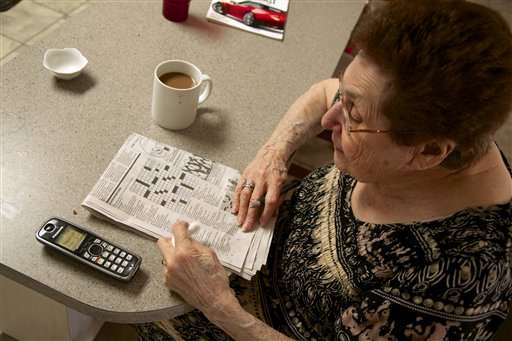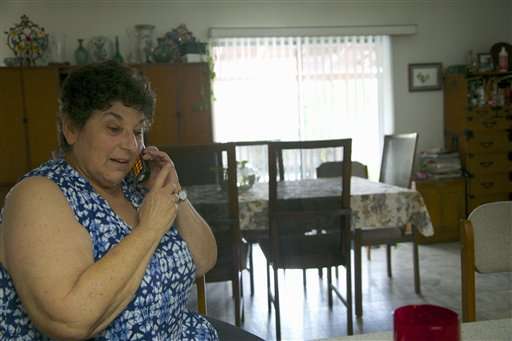Can phone companies do more to block robocalls?

Jeri Vargas put her elderly mother on the "Do Not Call" list years ago. So why is the 88-year-old woman with Alzheimer's disease still getting several recorded phone calls a day pitching her everything from vacation cruises to medical alert devices and fire extinguishers?
The Federal Communications Commission has been asked to consider the question of whether phone companies could do more to stop the onslaught of "robocalls," the automated phone calls favored by scammers. Since the convergence of Internet and phone lines, it's become easy to blast out hundreds of thousands of calls in a matter of minutes to see who takes the bait. The question of whether these calls can be blocked has never been more pressing than around tax season, when many pretend to come from the IRS.
The phone companies say they worry that automatic call blocking might run afoul of laws requiring them to connect phone calls and have asked the FCC to clarify that it doesn't. Many carriers offer call blocking services to consumers, sometimes for a fee. But they also don't want regulators to create any hard-and-fast rules, which they say could be difficult to implement.
Consumer groups counter that the phone companies are dragging their feet for no good reason and that, once given the green light from the FCC, could block most robocalls if they wanted.
"It is time for AT&T to provide free, effective solutions to this problem immediately, so that unwanted robocalls are stopped before they reach us," wrote Tim Marvin with Consumers Union in a recent letter to AT&T. The group, which has organized an online petition at EndRobocalls.com, sent similar letters to Verizon and Century Link.
AT&T says it's not as easy as it sounds. Robocallers can easily "spoof" their identity and location by pretending to be from a legitimate source or by altering the caller ID. So blocking robocalls is "a bit like a game of Whac-A-Mole: just as numbers are identified for blocking, the robocaller spoofs another number," the company said in an FCC filing.
The U.S. passed the widely popular "Do Not Call" legislation in 2003. Commercial telemarketers are not allowed to call you if you've put your number in the registry unless they have "an established business relationship" with you. But unsolicited phone calls remain a top consumer complaint. The Federal Trade Commission, which goes after businesses for deceptive business practices, say it receives on average of 150,000 complaints a month on robocalls and has filed more than 100 lawsuits against violators of the Do Not Call rules.

Still, regulators and phone companies say they remain stumped on how to fix the problem for good.
"For every company we can shut down, there are probably 10 to 100 companies that can pop up in its place," said Patty Hsue, an FTC staff attorney who leads the agency's technical initiatives against robocalls.
A common example is "Rachel from Cardholder Services." The automated voice recording encourages listeners to press a number, which connects them with someone who promised to lower their interest rates in exchange for an upfront fee. The FTC was able to trace the calls back to multiple people inside the U.S. and demand refund checks, but copycat scams continue.
For Vargas, it was the aggressive telemarketing calls that tipped her off to her mother's failing health. Yachting equipment arrived at the house one day, followed by magazines, books and light bulbs her mom didn't need. Vargas hid her mom's credit cards, only to find out later that a man claiming to sell fire extinguishers had her mom search through old statements to provide him a credit card number. Vargas says she thinks that robocalls were an easy way of identifying her mother as a vulnerable target. Now the phone rings all day long, but Vargas is reluctant to get rid of the line in case of an emergency.
"I don't mind if someone calls me because I can say, 'No thank you,'" said Vargas. "But it's hard for someone like my mom."
The problem has gotten so bad nationwide that the FTC in 2012 began offering cash prizes for technical solutions. Among the winners is Nomorobo, which hangs up on robocallers for you. But it only was built to work on certain phone lines, namely Voice-over-Internet Protocol, or VoIP.

Consumers groups say that the emergence of Nomorobo and other anti-robocalling technologies suggest the phone companies have the technical ability to spot obviously fraudulent calls.
Enter the National Association of Attorneys General. The group of state lawyers last fall, led by Missouri and Indiana, asked the FCC to clarify whether blocking robocalls might violate any telecommunications statutes. The major carriers say they agree that some legal guidance would be useful, but they also say they don't want to become beholden to any new regulation. USTelecom, an industry group, said in a statement that "complex technological and legal issues" remain.
The FCC confirmed this month that it is reviewing the NAAG petition, as it's required to do with any petition, but declined to comment further. There's no deadline for the agency to respond.
Five things to know about robocalls
The Federal Communications Commission has been asked to look into the issue of robocalls, the automated phone messages favored by political campaigns, charities and scammers. At issue is whether phone companies can do more to protect consumers from fraudulent calls.
Here are five things to know about robocalls:
___
SALES ROBOCALLS ARE ALMOST ALWAYS A SCAM. Robocalls are never allowed on cellphones, unless you give them prior written consent or it's an emergency. Robocalls to your landline are only allowed from political campaigns, charities, debt collectors, survey takers and information services such as your pharmacy or school. So if you get a robocall selling a product or claiming that a product has been purchased for you, hang up immediately.
___
THE SCAM. Scammers like to pretend they are conducting a survey or representing a charity before connecting you with a live operator who will try to sell you something. That's still illegal. Some also pretend to be from the IRS or Immigrations and Customs Enforcement, rambling off fake badge numbers and trying to scare people into thinking they will be audited or deported unless they pay a fee or divulge banking information.
__
DON'T PRESS "1." Pressing any number, even if it suggests that doing so will take you off their list, only confirms your number is working and that they have reached a live person. Engaging the call in any way will just lead to more calls.
___
CALLER ID MEANS NOTHING. It's called "spoofing," and it prevents you from knowing where the call is really coming from. You can ask your phone company to block a particular number. But by the time you do that, the same scammers will probably move on to a different number. Your own phone number can even appear on the caller ID, whereas the call might be coming from overseas.
___
REGISTER YOUR NUMBER ON THE 'DO NOT CALL' LIST. But don't expect much. Scammers ignore the registry so it's unlikely to stop the problem. But at least then you'll know that every time you get a call, and it's not a political campaign, survey or charity, it's a scam. Under the rules, a company can only call you if you have an "established business relationship." Even in that case, it has to be a live sales call and not a robocall.
___
On the Web: www.donotcall.gov/
© 2015 The Associated Press. All rights reserved.
















